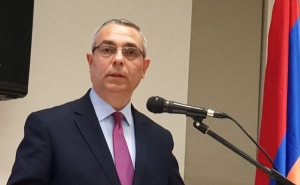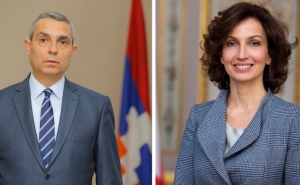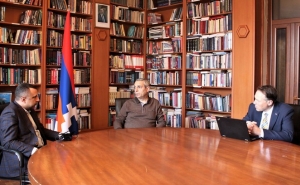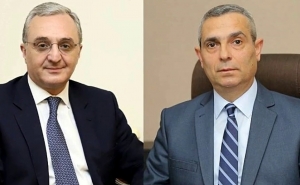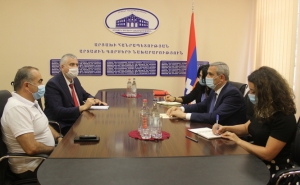Minister of Foreign Affairs of the Republic of Artsakh Masis Mayilian's Interview to ‘Nationalia’ News Agency Operating in Barcelona

Minister of Foreign Affairs of the Republic of Artsakh Masis Mayilian's Interview to ‘Nationalia’ News Agency Operating in Barcelona.
Demonstrations in Baku brought thousands to the streets in July, asking the Azerbaijani government to start a full-scale war to retake Karabakh. Does your ministry believe an attack by Azerbaijani forces is likely at some point? If so, how is Karabakh ready to protect itself, given the fact that Azerbaijan has been for years strengthening its military capabilities?
If one considers the pace and scope with which Azerbaijan builds up its military arsenal, it becomes clear that it doesn’t buy arms to store in a warehouse, but rather with an intention to use them one day. And it will use every opportunity to test the grounds, to check if it is the right time to start a new aggression. We have seen Azerbaijan doing so in April 2016, and quite recently, on July 12, on the Armenian-Azerbaijani border, in the Tavush region of Armenia. In both cases Аrtsakh and Armenian defence forces gave an appropriate response. There is no reason to believe that Azerbaijan will not give it another try when it feels itself strong enough to unleash another military adventure. And , of course, we know it and Artsakh Defence Army stands ready to rebuke any aggression as it has done before.
How is your ministry, and the larger Artsakh government, working in the international diplomatic arena in this context in order to strengthen the position of your republic, given the fact that it continues to be unrecognized?
Our ministry, and Artsakh authorities, in general, do their utmost to present to the world the true picture of the events. The position of our Republic has been unchanged since the proclamation of its independence. We have always been in favour of the resolution of the conflict exclusively by peaceful means. This position has been voiced on numerous occasions both publicly and during the meetings with the OSCE Chairperson- in- Office and Minsk Group Co-chairs, and many statements of the foreign ministry circulated in the international organizations like OSCE, UN, CE etc. We make no secret of the fact , that we want peace, at the same time we realize what an ancient Latin philosopher had in mind noting “Si vis pacem, para bellum -If you want peace, be prepared for war”. And we have gone through it already.
Sometimes, a single glance at the region is enough to understand the underlying reality of the developments taking place in the conflict zone. As you have mentioned in your first question, thousands of demonstrators in Baku demanded from the Azerbaijani government to start a large-scale war. In fairness, however, it should be noted that the demonstrators that broke into the country’s parliament building also had an anti-government agenda. It just shows the role the conflict plays in the internal life of Azerbaijan and how prepared is the Azerbaijani society, and the government for peace or the peaceful settlement of the conflict.
Peace can not be reached unilaterally, all sides to the conflict should strive for it. And no matter, how loudly we announce of our readiness to reach peace with our neighbors, they should be both receptive and perceptive of peace. Unfortunately, for years the anti-Armenian sentiments in Azerbaijan have been cultivated into a state-run policy and instead of preparing its population for peace, Azerbaijan has been preparing it for war. This is the reality we face today. And this is the reality the international community should deal with. Independent of the fact whether the country is recognized or unrecognized , it is the people that we should think of. And we do our part not only to ensure the security and safety of our people, but to play a constructive role in contributing to peace and stability in the region.
Nikol Pashinyan’s ascent to power in Armenia in 2018 had opened the door, according to some analysts, to new prospects of reaching bilateral deals with Azerbaijan that could eventually lead to some advances in peace talks. You are in close contact with the Armenian leadership. Why this has not been the case?
As I have already mentioned peace can not be reached unilaterally. Azerbaijan should work towards peace as well, through contributing to the atmosphere of trust that will allow for the peace process to take off. Without excluding the possibility of the use of force and creating an atmosphere conducive to the resumption of peace talks, the situation will not get any better. And, most importantly, Azerbaijan should understand once and for all that without the resumption of the trilateral format of negotiations with the direct participation of the Republic of Artsakh in them, it is naive to expect any tangible progress in the peace process. Let me remind here, that the only significant achievement in the peace process to date has been the signing of the term-less cease-fire agreement in May 12, 1994, when Artsakh participated in the talks. And it is logical that if the Agreement to cease the hostilities and fire was signed by Artsakh (Nagorno-Karabakh) as one of the two main parties to the conflict, hence the peace deal should also be negotiated and signed by Artsakh . To ignore this fact, would mean to deliberately negate peace.
Azerbaijan and the relevant international agencies should work towards improving Azerbaijan’s human rights record, fostering democratic developments in the country and educating its society about the benefits of peace and not war.
Turkish minister of Defence Hulusi Akar said Turkey would give all support to Azerbaijan in the current context and recalled that, according to him, Turkey and Azerbaijan are “one single nation.” But at the same time, a Turkish intervention in a full-scale war might have the potential to further damage Ankara’s relations with Russia, not to say the destabilization of the entire region. How do you assess Turkey’s stance in this regard?
Turkey has never been neutral in its stance over the conflict despite being a member of the OSCE Minsk Group that through its tripartite co-chairmanship mediates the peaceful settlement of the conflict. It is the only country in the region, that has not only publicly voiced its support for the brotherly Azerbaijan but also has backed the Azerbaijani blockade of Armenia and the Republic of Artsakh. It is not a secret that Turkey also helps Azerbaijan in army-building, considering that many Azerbaijani officers are trained in Turkey and Turkish military consultants advise the Azeri military leadership.
We consider the statement by the Turkish Government in support of the provocations and violations of the ceasefire regime by Azerbaijan unacceptable. We emphasize once again that such a position of Turkey makes its membership in the OSCE Minsk Group senseless.
It should be clear that South Caucasus is a region with a very complex geopolitics and multiple players; both regional and outside the region; with varying levels of interests. And it is not by chance that the Co-chair countries of the Minsk group dealing with the conflict are Russia, France and the US.
One thing is clear: if the hostilities resume in the region it will be catastrophic not only for the region, but for the whole international community. The Republic of Artsakh stands ready to take its share of responsibility for maintaining peace and security in the region, its time for other stakeholders do the same.
Other materials on this subject
- Russian forces have clearly failed in their duties: senators press Biden Administration to break Azerbaijan’s blockade The United States cannot stand aside while the Aliyev regime callously threatens the lives of Nagorno-Karabakh’s citizens, and must hold Azerbaijan to account for blocking a civilian population’s access...
- US calls for the full restoration of free movement through the Lachin Corridor "We remain concerned about impeded access to the Lachin Corridor and the humanitarian implications of this situation. This sets back the peace process and undermines international confidence. We call for...
- Azerbaijani forces violate the ceasefire in Artsakh The ceasefire violation was reported to the command of the Russian peacekeeping troops.
- Azerbaijani units violate ceasefire in several directions, Artsakh’s Defense Ministry says The Armenian side has no losses. The incidents of ceasefire violations were reported to the command of the Russian peacekeeping troops.
- Russian Diplomat Reassures Armenians Over Corridor In Karabakh "The parties are in direct contact, and I assure you that the peacekeepers will not move a single centimeter until there is a new corridor," Seleznyov said.
-
 17:08
17:08The regular session of the Anti-corruption Policy Council takes place in Jermuk
-
 15:05
15:05The Prime Minister sends congratulatory messages to the supreme leader of Iran and the President of Iran
-
 11:11
11:11Armenia sends earthquake aid to Turkey
-
 10:43
10:43Commemoration of the Pontiff St. Sahak Partev
-
 09:16
09:16Some roads are closed and difficult to pass in Armenia
-
 19:55
19:55Phone conversation of the Foreign Minister of Armenia with the U.S. Assistant Secretary of State for European and Eurasian Affairs
-
 18:30
18:30Prime Minister Pashinyan and President Khachaturyan meet
-
 18:20
18:20Ararat Mirzoyan with Co-Chairman of the OSCE Minsk Group of France Brice Roquefeuil
-
 17:01
17:01Humans could land on Mars within 10 years, Musk predicts
-
 16:45
16:45France, US urge 'immediate' end to Nagorno Karabakh blockade
-
 16:01
16:01Blockaded Nagorno Karabakh launches fundraiser to support quake-hit Syria
-
 15:59
15:59Earthquake death toll in Turkey rises to 18,342
-
 15:43
15:43Ararat Mirzoyan Held a Telephone Conversation with Sergey Lavrov
-
 15:06
15:06French president rules out fighter jet supplies to Ukraine in near future
-
 14:47
14:475 Day Weather Forecast in Armenia
-
 14:44
14:44President Vahagn Khachaturyan wrote a note in the book of condolences opened in the Embassy of Syria in Armenia
-
 14:20
14:20Azerbaijan’s provocations impede establishment of peace and stability – Armenian FM tells Russian Co-Chair of OSCE MG
-
 12:57
12:57France representation to OSCE: Paris calls on Azerbaijan to restore freedom of movement through Lachin corridor
-
 11:40
11:40Command of Kosovo forces highly appreciated preparation of Armenian peacekeepers
-
 10:16
10:16The United States withdrew from sanctions against Syria for six months the provision of assistance after the earthquake
day
week
month
Humidity: %
Wind: km/h


